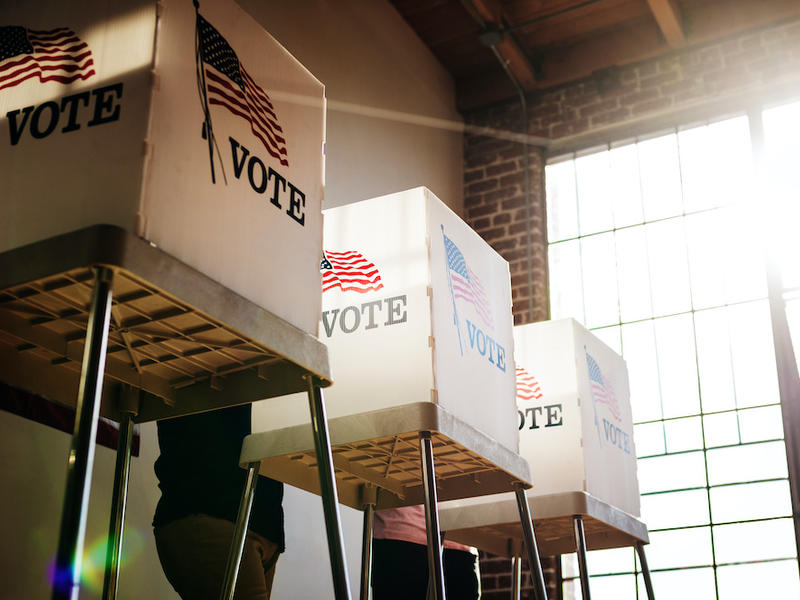
For the first time in memory, low approval ratings of a sitting president didn't cause a disaster for his party in a midterm election. Many Democratic candidates in 2022 succeeded in winning over voters who "somewhat" disapproved of Biden — a group I dubbed last fall as the "meh" voters. Presidents Donald Trump and Joe Biden both came into their first midterm election with similar job approval ratings (44% approve to 55% disapprove). But, according to exit polls, among those who "somewhat" disapproved of Biden, 49% voted for the Democrat and 45% voted for the Republican. In 2018, those "somewhat" disapprovers of Trump voted overwhelmingly for the Democratic candidate (63% to 34%).
Today, Biden's job approval ratings aren't any stronger than they were in 2022. That leads us to wonder if these 'meh' voters will again be critical to Democrats' success in 2024. And, if so, is a president's job approval rating — once considered a critical metric in assessing his reelection chances — no longer pertinent?
Since at least 1980, a president's job approval rating has been one of the most consistent (and accurate) predictors of electoral performance. Voters who think the president is doing a good job vote to reelect the president. Voters who think the president is doing a lousy job are almost certain to vote for his opponent, even among those who only "somewhat" disapprove of the president's performance. For example, in 2020, according to exit polls, 97% of those who strongly disapproved of Trump voted for Biden. Among those who "somewhat" disapproved of Trump, a solid 89% voted for Biden and just 7% pulled the lever for Trump.
As such, for the last 40 years, the final Gallup job approval ratings for an incumbent president seeking reelection were within one to four points of that president's final vote margin. In 1980, for example, President Jimmy Carter entered the final week of the election with a 37% approval rating. He ended up taking just 41% of the popular vote in his loss to former California Gov. Ronald Reagan.
If that trend were to hold in 2024, Biden's current job approval rating of 43% would suggest that at best, he could hit 47% of the national popular vote in 2024. Given that key swing states like Wisconsin, Pennsylvania and Georgia, according to the Cook PVI, voted two to three points more Republican than the national average, 47% of the national popular vote would not be enough to win the Electoral College.
Yet, at this point, the share of voters who say they would vote for Biden over Trump is significantly higher than his job approval rating.
For example, a March 29 Quinnipiac poll found Biden's job approval rating at a dismal 37%, with 57% disapproving. Even so, in a head-to-head matchup against Donald Trump, Biden took 48% to 46% for Trump. Biden's vote share was a whopping 11 points higher than his job approval rating.
A Wall Street Journal poll from mid-April found similar results. Biden's overall job approval rating was 42%, yet he led Trump by two points, taking 48% of the vote — a six-point improvement over his approval rating.
Why? Well, as we saw in 2022, those who "somewhat" disapprove of the job Biden is doing overwhelmingly back him for reelection. According to the Quinnipiac survey, the 13% of voters who "somewhat" disapprove of Biden say they'll vote for him by an 11-point margin (48% to 37%) over Trump. The Wall Street Journal poll showed similar results. The 8% of respondents who "somewhat" disapprove of Biden on job approval pick Biden over Trump in a head-to-head matchup, 66% to 19%.
Trump, meanwhile, does not get support from the "somewhat" disapprovers. According to data from the Wall Street Journal, those who "somewhat" disapprove of Trump picked Biden over Trump, 56% to 18%.
Even up against DeSantis — who is not as well known as Trump — Biden still wins over most of the "somewhat" disapprovers. In the Quinnipiac survey, "somewhat" disapprovers supported Biden over DeSantis by 19 points (54% to 35%). In the Wall Street Journal survey, those who "somewhat" disapprove of Biden picked him over DeSantis, 50% to 32%.
In other words, Biden's disapproval ratings are not telling the full story of his electoral chances. In fact, writes former AFL-CIO political director Michael Podhorzer, "if media polls want to better serve the public, they would scrap the approval question, as well as the trial heat, and instead, for example, ask respondents to rate the possibility that they will vote for Biden and for Trump (two separate questions). This is one strategy that actual campaigns, as well as others with resources and high stakes in the outcome, use to get better insight into the race."
Podhorzer has a good point. Our deep partisan polarization means few voters are willing to give the benefit of the doubt to the opposite party. Or, even when frustrated with their own party, are willing to vote for a candidate from the other party.
Even so, the fact that those who "somewhat" disapprove of Biden are still committed to supporting him, while those who "somewhat" disapprove of Trump and DeSantis are not planning to vote for either of those men, is worth exploring further.
Who are they? What matters to them? Who did they support in the previous election? Did they vote in 2020? And, most importantly, how likely are they to show up and vote come Election Day? The "somewhat" disapprovers of Biden are unhappy with the president for some reason, but they also dislike the GOP alternative. Is the fear of that Republican winning enough to motivate them to show up and vote? Or, will they express their 'meh’-ness about Biden and the alternatives to him by simply staying at home?
Moreover, current polling shows that if DeSantis is the nominee, just winning over "somewhat" disapprovers may not be enough for Biden to win. In the Quinnipiac poll, for example, DeSantis beats Biden among independent voters by 19 points (compared to Trump, who wins them by just nine points).
Polling done by the GOP firm Public Opinion Strategies (April 11-13), of 500 voters in each of six battleground states (Arizona, Pennsylvania, Georgia, Nevada, Michigan and Wisconsin), finds DeSantis leading Biden in every state, while Trump trails Biden in all six. Moreover, DeSantis, their surveys find, outperforms Trump among Biden “somewhat” disapprovers by anywhere from 8 to 36 points.
However, DeSantis also remains relatively undefined, with 24% unable to assess the Florida governor in the Quinnipiac poll, 18% in the Wall Street Journal poll and about 27% in the POS survey. Should DeSantis start to get some traction in the GOP primary, look for Democrats to increase their efforts to tie DeSantis as closely as possible to the MAGA movement. But, argues POS pollster Robert Blizzard, Democrats “are already coalesced behind Biden against any GOP candidate. The difference is likely the energy level of Democrats against Trump versus [the energy level against] DeSantis.”
Bottom line: it's time for us to take the "somewhat" disapprovers today as seriously as we took "Trump to Biden" voters in 2020. And, hey, if anyone has money to do focus groups with these voters, I'd be happy to tag along.


Subscribe Today
Our subscribers have first access to individual race pages for each House, Senate and Governors race, which will include race ratings (each race is rated on a seven-point scale) and a narrative analysis pertaining to that race.